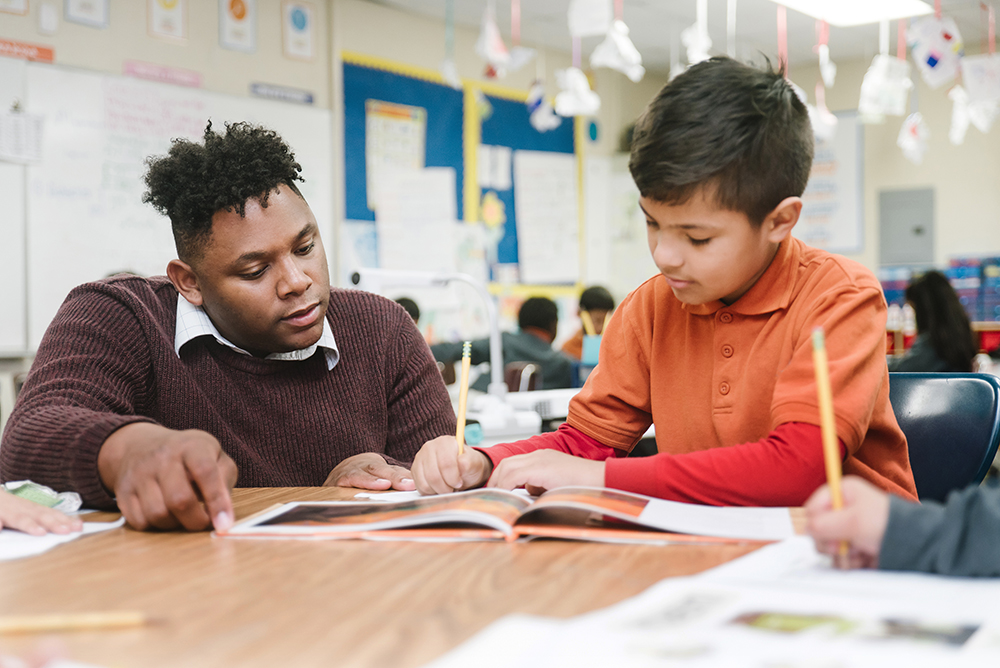Institute Offerings Grounded in Research-Based Practices
Collaborative Classroom offers curated institutes that empower educators to transform classrooms, build school communities, and inspire the academic and social growth of children. These dynamic and interactive professional learning experiences support deep learning and increase collaboration among educators.
Using a variety of groupings and discussion protocols, our institutes drive structured district-leader and school-team discussions as educators delve into a vital examination of research-based literacy practices.
Find out more about each of our institutes:

Institutes About Reading Instruction
- Putting Readers First—Fostering Independent Learners Through Transformative Teaching
- Supporting New and Striving Readers with Small-Group, Mastery-Based Intervention
- Accelerating Foundational Skills for Older Readers
- One Size Doesn’t Fit All: Making the Case for Differentiated Small-Group Reading Instruction
- Where the Science of Learning Meets the Science of Reading
Putting Readers First—Fostering Independent Learners Through Transformative Teaching
The ability to read is a fundamental right and a gateway to success, but becoming a reader means more than acquiring skills—it’s about fostering independence, curiosity, and a lifelong love of learning. How can educators help students master essential reading skills while building the confidence and competence to tackle complex academic tasks, explore diverse ideas, and take ownership of their learning?
In this institute, we’ll explore transformative practices that put “readers first” by building confident, self-directed learners.
Participants will:
- Connect the science of reading with the science of learning to deepen instructional impact.
- Experience evidence-based lessons that integrate social skills development with comprehension instruction.
- Analyze lesson routines that build foundational skills while promoting independence.
- Learn strategies to create an environment where students view literacy as a tool for academic success, personal growth, and understanding the world.
Educators will leave equipped with strategies to empower students to thrive as lifelong readers and independent learners, recognizing the transformative power of literacy in their lives.

Supporting New and Striving Readers with Small-Group, Mastery-Based Intervention
Elementary students who struggle with reading need immediate and effective support to address foundational skill gaps. This interactive institute focuses on providing differentiated, research-based instruction to help students build the skills and confidence they need to succeed.
Grounded in professional journal articles and current studies, this session bridges research to practice. Participants will experience effective instructional routines from the SIPPS program and explore how structured literacy lessons can accelerate learning. Additionally, we’ll examine the essential characteristics of connected texts that engage struggling readers and provide meaningful practice for skill mastery.
Participants will:
- Unpack research from professional readings and explore implications for foundational skills instruction.
- Experience structured literacy routines that build critical reading skills.
- Analyze the features of connected texts that engage readers and promote mastery of foundational skills.
- Learn strategies for designing differentiated small-group instruction to meet the diverse needs of students.
This session provides practical tools and insights to support struggling readers and foster success in foundational literacy.
Accelerating Foundational Skills for Older Readers
Striving upper elementary, middle, and high school readers need immediate and effective support to identify and address reading challenges, which often stem from gaps in foundational reading skills. This institute is designed for educators and school leaders committed to providing research-based, age-appropriate, and dignified instruction to older students facing reading difficulties.
Through this interactive experience, participants will explore the research outlined in the IES Practice Guide: Providing Reading Interventions for Students in Grades 4–9 and learn how to bridge research into practice. Participants will engage in structured literacy lessons, experience effective instructional routines, and analyze the characteristics of connected texts that motivate older readers while supporting skill mastery.
Participants will
- Examine the key recommendations from the IES Practice Guide to support struggling readers in grades 4–9.
- Experience and practice structured literacy routines tailored to older students.
- Identify the features of connected texts that both engage students and reinforce foundational skills.
- Learn how to design and deliver respectful, research-based interventions that meet the unique needs of older readers.
This institute empowers educators with tools and strategies to accelerate foundational skill development and transform outcomes for vulnerable readers.
One Size Doesn’t Fit All: Making the Case for Differentiated Small-Group Reading Instruction
This interactive session for K–2 teachers highlights the transformative power of differentiated small-group instruction in helping young children master foundational reading skills. While whole-class instruction builds essential literacy foundations, targeted small-group instruction is proven to address individual needs and accelerate growth effectively.
Participants will:
- Discuss the impact of small-group instruction and how intentional, differentiated support empowers students to build reading skills at their own pace.
- Watch and evaluate small-group lessons to identify strategies that engage students, boost confidence, and guide progress from decoding to fluent reading.
- Review examples of texts that support early readers as they transition to independent reading, focusing on how various text types strengthen foundational skills.
Teachers will leave this session with a deeper understanding of why “one size doesn’t fit all” in literacy instruction and practical strategies for implementing differentiated small-group instruction to meet the unique needs of every reader.
Where the Science of Learning Meets the Science of Reading
While the science of reading explains what is essential for building skilled readers, the science of learning reveals the conditions that allow learning to thrive and endure. This session brings these two fields together to help educators create environments that support the development of independent, lifelong learners.
Participants will engage in professional readings, discussions, and lesson and video analysis to connect research to practice. Grounded in the components of Scarborough’s Reading Rope and the SoLD (Science of Learning and Development) Alliance, this session explores how applying principles from the science of learning enhances reading instruction and meets the needs of the whole child.
Participants will:
- Learn the foundational principles of the science of learning and how they align with the science of reading.
- Explore the components of Scarborough’s Reading Rope and their connection to evidence-based learning practices.
- Analyze lessons and videos to identify effective strategies that support literacy learning and promote independence.
- Discover ways to integrate these principles into instruction to foster independent, engaged learners.
Learn how combining the science of learning with the science of reading can transform literacy instruction, foster independence, and support the whole child.
Institutes About Writing Instruction
Bringing Writing to Life: Exploring the Research and Practice of Writing Instruction
Teaching writing as a distinct content area is essential for fostering effective communication, creativity, and critical thinking—skills vital for both academic and personal success. Despite its importance, writing instruction often takes a back seat in crowded schedules, leaving educators challenged to provide the time and guidance students need to grow as writers. This session unpacks the research and offers practical strategies to bring writing to life in your classroom.
Participants will:
- Learn how to build a thriving community of writers where students feel supported and inspired.
- Review research on effective writing instruction and its implications for practice.
- Experience lessons and strategies that engage students in purposeful daily writing for authentic audiences and encourage them to revise and apply learned skills.
- Consider ways to connect nonfiction reading and writing to deepen literacy development across content areas.
By prioritizing writing instruction, educators can equip students with the tools to express themselves, think critically, and grow into lifelong writers. Leave this session with lesson examples and professional resources to help you bring writing to life in your classroom.

Questions?
Get in touch with your local Manager of Educational Partnerships to discuss bringing an institute to your school or district.